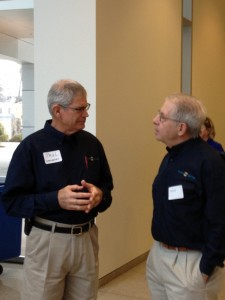 On January 26, 2013, Andy and I were facilitators and observers at the Third Annual “Build a Better Budget” games held with the City of San Jose, California. Last year I got snowed out but Andy was there. While he was very excited about what had taken place at last year’s games and described them over and over to me, and we watched the videos, there is nothing that replaces the actual experience. And this was quite a remarkable experience that makes the idea of democracy come alive in very real ways. I am going to take you through highlights but if you have any involvement in a community that would like to engage their citizens in an active, meaningful play around how to best raise revenues, cut taxes, or spend, redesign or eliminate programs, you must try a budget game. To know more, take a look at budget games from 2011 and 2012 on the Innovation Games® website and read this article from FT Magazine, “Playing the budget game.”
On January 26, 2013, Andy and I were facilitators and observers at the Third Annual “Build a Better Budget” games held with the City of San Jose, California. Last year I got snowed out but Andy was there. While he was very excited about what had taken place at last year’s games and described them over and over to me, and we watched the videos, there is nothing that replaces the actual experience. And this was quite a remarkable experience that makes the idea of democracy come alive in very real ways. I am going to take you through highlights but if you have any involvement in a community that would like to engage their citizens in an active, meaningful play around how to best raise revenues, cut taxes, or spend, redesign or eliminate programs, you must try a budget game. To know more, take a look at budget games from 2011 and 2012 on the Innovation Games® website and read this article from FT Magazine, “Playing the budget game.”
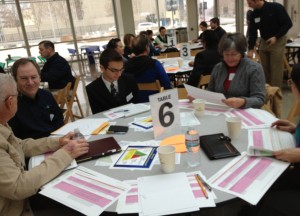 Luke Hohmann, developer of Innovation Games, adapted “Buy a Feature” for the City of San Jose. So why in the world do we ask people to play games anyway? Games and play help people eliminate the “win/lose” of trade-offs and decision-making because they can “play” with the options and decide what they would choose to do. Several times during the three-hour session, the people at the table, particularly those who had played previously, reminded each other that it is a ‘game’ but a serious one. So not taking themselves too seriously, they played with the fake money around real issues that had to be decided. Should they raise a sales tax or a business tax or take a person off every fire truck? Should they keep libraries open or reduce their hours? Should there be a community group to address gang problems or should they hire more police officers? You get the sense of what they had to decide on and how the city manager and mayor would soon be listening to their discussions and debates and decisions.
Luke Hohmann, developer of Innovation Games, adapted “Buy a Feature” for the City of San Jose. So why in the world do we ask people to play games anyway? Games and play help people eliminate the “win/lose” of trade-offs and decision-making because they can “play” with the options and decide what they would choose to do. Several times during the three-hour session, the people at the table, particularly those who had played previously, reminded each other that it is a ‘game’ but a serious one. So not taking themselves too seriously, they played with the fake money around real issues that had to be decided. Should they raise a sales tax or a business tax or take a person off every fire truck? Should they keep libraries open or reduce their hours? Should there be a community group to address gang problems or should they hire more police officers? You get the sense of what they had to decide on and how the city manager and mayor would soon be listening to their discussions and debates and decisions.
What is so interesting about these games is that Andy 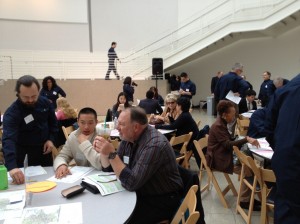 and I had different roles to play at different tables and each table went about the games differently. Mine decided to agree to the revenue and cost issues first so they knew how much money they had to work with. His went after the top priorities. Some of the tables went immediately to public safety. Mine discussed community centers and libraries and thought there were enough police and firemen but that they had to be used more effectively.
and I had different roles to play at different tables and each table went about the games differently. Mine decided to agree to the revenue and cost issues first so they knew how much money they had to work with. His went after the top priorities. Some of the tables went immediately to public safety. Mine discussed community centers and libraries and thought there were enough police and firemen but that they had to be used more effectively.
One of the goals of “Build a Better Budget” games is to bring in people from different parts of the community. At the San Jose ones, there were youth commission members and self-employed small business people alongside community group leaders and retirees.
As part of Luke Hohmann’s vision to bring Innovation Games and Every Voice Engaged to a global audience, he recruits facilitators and observers from around the world. Our facilitator came from the UK. Others came from Mexico, Scandinavia, Canada and different parts of the US. The diversity among the volunteer facilitators was as interesting as the participants’ diversity.
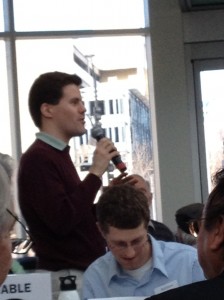
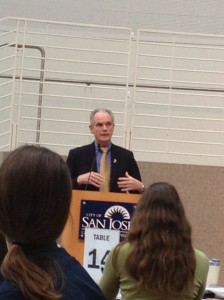
We will let you know when San Jose posts its results and the final reports are presented.
Significantly, many of the budget decisions made in the last two years of San Jose’s “Build a Better Budget” games have helped the city’s budget yield a surplus and stabilize its expenditures, not always in a way that everyone agreed upon but with high involvement, ensuring that the decisions were more reflective of the community’s needs and wishes. After all, it is their tax money.



